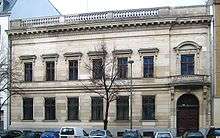Mendelssohn & Co.
Mendelssohn & Co. was a private bank based in Berlin, Prussia. During the 19th and early 20th centuries, it was one of the preeminent banking houses in Europe.

History
It was established in 1795 by Joseph Mendelssohn in Berlin. In 1804, his younger brother Abraham Mendelssohn Bartholdy joined the company. In 1815, they moved into their new headquarters at Jägerstraße 51, thereby laying the foundations of Berlin's financial district. Mendelssohn & Co. remained in that building until its divestiture in 1939.
Mendelssohn quickly rose to prominence among European banks. Starting in the 1850s, they acted as Royal bankers for the Russian Tsar, dominating the Central European financial market for Russian sovereign bonds until World War I. The Mendelssohn family through the descendants of the founding brothers continued to run the company.
Mendelssohn & Co. survived the financial meltdown of the 1930s comparatively well. Following the death of Franz von Mendelssohn and Paul von Mendelssohn-Bartholdy in 1935, Rudolf Löb was appointed as chairman of the bank, the first non-family member to be chairman. In 1938, under intense pressure of the Nazis' Aryanization policy, Mendelssohn & Co. were forced to hand over their assets to Deutsche Bank, and eventually to shut down.[1]
Notable employees
See also
References
- Gall, Lothar & Underwood, J. A. (1999), "Hermann Josef Abs and the Third Reich: 'A man for all seasons'?", Financial History Review, 6 (2): 147–202 [pp. 163–173], doi:10.1017/S0968565000000378.
Further reading
- Förster, Andreas (1997-10-17). "Das ungeklärte Ende des Bankhauses Mendelssohn". Berliner Zeitung..
- James, Harold (2001). The Deutsche Bank and the Nazi economic war against the Jews. New York: Cambridge University Press. pp. 70–77. ISBN 0-521-80329-2.
- Köhler, Ingo (2005). Die "Arisierung" der Privatbanken im Dritten Reich (in German). Munich: C. H. Beck. pp. 244–256. ISBN 3-406-53200-4.